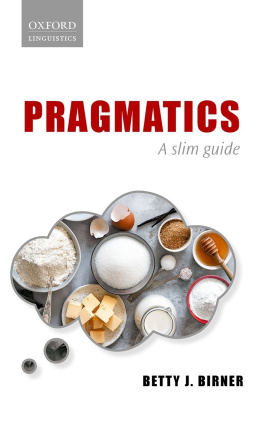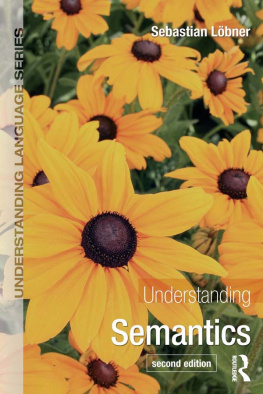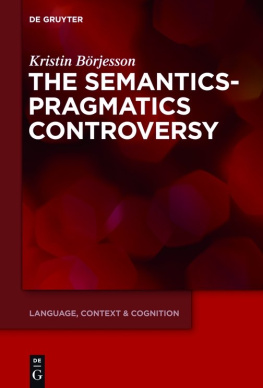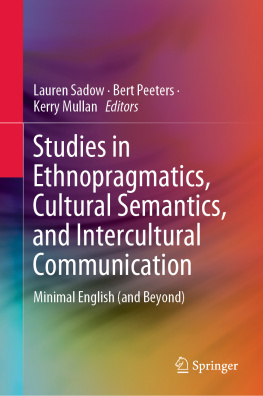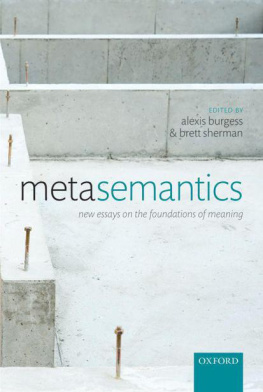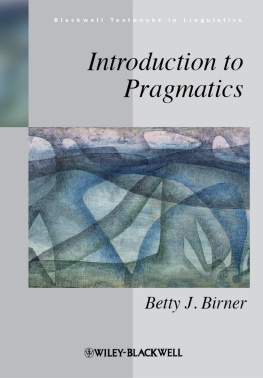Pursuing Meaning
Emma Borg
(p.iv) 
- Great Clarendon Street, Oxford OX2 6DP
- Oxford University Press is a department of the University of Oxford.
- It furthers the University's objective of excellence in research, scholarship,
- and education by publishing worldwide. Oxford is a registered trade mark of
- Oxford University Press in the UK and in certain other countries
- The moral rights of the author have been asserted
- First Edition published in 2012
- All rights reserved. No part of this publication may be reproduced,
- stored in a retrieval system, or transmitted, in any form or by any means,
- without the prior permission in writing of Oxford University Press,
- or as expressly permitted by law, or under terms agreed with the appropriate
- reprographics rights organization. Enquiries concerning reproduction
- outside the scope of the above should be sent to the Rights Department,
- Oxford University Press, at the address above
- You must not circulate this work in any other form
- and you must impose this same condition on any acquirer
- British Library Cataloguing in Publication Data
- Data available
- Library of Congress Cataloging in Publication Data
- Data available
- Printed in Great Britain by
- MPG Books Group, Bodmin and King's Lynn
Dedication
(p.v) For Jim, Ted, and Alfie. (p.vi)
(p.ix) Preface
This book examines some recent answers to the questions of how and where to draw the divide between semantics (roughly, features of the literal meaning of linguistic items) and pragmatics (roughly, features emerging from the context within which such items are being used). In particular, this book attempts a defence of what is commonly known as minimal semantics (aka semantic invariantism or insensitive semantics). Minimal semantics, as the name suggests, wants to offer a pretty minimal account of the inter-relation between semantics and pragmatics. Specifically, it holds that while context can affect literal semantic content in the case of genuine (i.e. lexically or syntactically marked) context-sensitive expressions (e.g. indexicals, demonstratives, tense markers), this is pretty much the limit of pragmatic input to semantic content. On all other occasions where context of utterance appears to affect content the minimalist claims that what it affects is not literal, semantic content but what the speaker conveys by the use of this literal contentit affects what a speaker says not what a sentence means. So minimalists are fond of making claims along the following lines: the sentence Snow is white means that snow is white, the sentence Ted is ready expresses the proposition that Ted is ready, and the sentence there is nothing to eat is true iff there is nothing to eat. For the minimalist, then, the semantic content of these sentences is not (as some theorists contend) a pragmatically enriched content such as snow is white in some contextually determined respect, or Ted is ready to play football, or there is nothing appropriate to eat in the kitchen. Though a speaker may convey a more complex content such as one of these, this is held to be a feature of pragmatic speaker meaning not semantic sentence meaning.
Notice that minimalism does not claim that pragmatics has no effects on semantics. This claim has been made (e.g. see Katz To claim that pragmatics has no role to play at all within the semantic realm is very likely to lead to the claim that the subject matter of semantics is sub-propositional or non-truth-evaluable content. The reason for this is pretty easy to see: consider the sentence Im here now. Unless one is able to look to a specific context in which this sentence is uttered it will be impossible to deliver values for the context-sensitive terms I, here and now. Yet without such values any content we can recover for the sentence (perhaps in terms of a Kaplanian character) is bound to fall short of propositional, truth-evaluable content. The minimalist wants to preserve the idea that semantics trades in truth-evaluable content, thus she is driven to allow some contextual influence on semantic content, though her hope is that this influence can be limited to tame pragmaticsthe kind of rule-governed appeals to context which wont scare any formally minded horses.
The niche the minimalist wants to carve out for herself is then, we should recognize from the outset, potentially precarious. The problem is as follows: on the one hand, it seems clear that that we need (i) a level of content which is determined simply by word meaning and structure, where this is context-invariant yet not necessarily propositional content. We need this kind of context-invariant core to linguistic meaning to explain how it is possible to understand or learn a language in the first place, to make language a vehicle for successful communication, to account for features of our comprehension like its systematicity and productivity (to be explained below, see Chapter This book is an attempt to rebut both these lines of argument and to show that minimalism is a feasible and attractive semantic theory.
Chapter will close with an overview of at least some of the possible dimensions along which parties to the debate either agree or disagree.
Now, as excessively well-informed readers may know, minimal semantics is actually a position I have defended before (see, e.g. Minimal Semantics, Borg , or compare the Soames of 2002 with the Soames of 2005). So, since minimalism remains a theory Im partial to, a first reason for writing this book is to have another go at convincing others of its attractions (and conversely, of course, to stress the pitfalls of alternative accounts in the area).
Secondly, it seems to me that what is really at issue in the debate between minimalism and competitor accounts, like contextualism (of which much more below), is sometimes obscured in work on this topic. What I take to be really crucial to minimalism is the denial of what King and Stanley (and indeed throughout) will be that, when properly understood, minimalism turns out to have a wider arsenal of defensive weapons available to it than is sometimes supposed.
A third reason to revisit this topic is that the terrain which minimalism seeks to occupy looks rather different today than it did when I was writing the last book. At the time of writing Minimal Semantics it seemed to me that the really exciting news (exciting at least to those of us with quiet social lives) was the emergence, and growing popularity, of accounts which allowed pragmatic processes to contribute to what was traditionally thought of as semantic content (i.e. to the first complete or truth-evaluable proposition recoverable on the basis of a sentence) in ways which didnt depend on lexico-syntactic context-sensitivity. This claim perhaps first emerged with Atlas and Kempson's position that sentences containing not were semantically underdetermined, requiring contextual completion to settle questions of scope (see Atlas .



